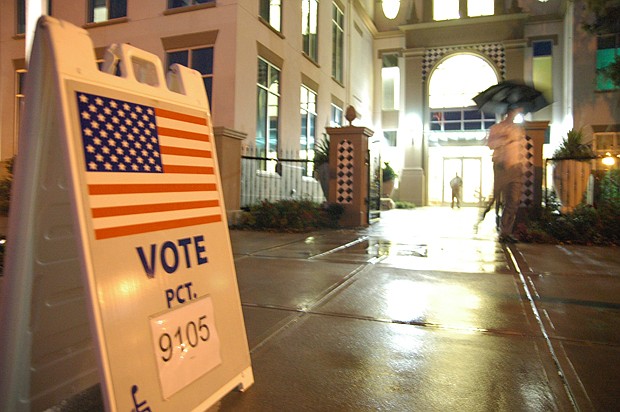- April 18, 2024
-
-
Loading

Loading

Twenty-nine ballot amendments greeted voters at the polls in Maitland on Tuesday, and 27 of them passed.
The massive ballot, described by Orange County Supervisor of Elections Bill Cowles as the largest he’s ever seen, included charter amendments ranging from the right to fire commissioners for unlawful or unbecoming behavior to preventing former mayors from running for office again too soon. But the sheer size of the ballot caused contention, with Council candidate Charlie Adkins’ wife Debbie remarking that the large ballot may have kept voters away from the polls.
That ballot included amendments that appeared to be duplicates of other amendments, or simply related to spelling changes, swelling the ballot.
“The clarifications are very important,”Councilwoman Linda Frosch said of numerous “housekeeping” changes to the charter. “We needed to make that document a tighter document. Today was the time to do it.”
Mayor Howard Schieferdecker said that he had heard multiple complaints from voters that the large ballot was confusingly written and difficult to understand.
“I read the way they were written and it was terrible,” Schieferdecker said. “There were so many people complaining about the fact that they didn’t understand them. I’m actually surprised that so many of them passed. Usually when people don’t understand something they vote no.”
Despite the large lapse in time between charter changes, many of the more sweeping changes directly addressed recent contentious episodes on the Council.
Recalling actions taken by former Mayor Doug Kinson, several charter amendments clarified restrictions on mayors running for office after their second term. Amendment 3, which would prevent the mayor from running for a city council seat for one election cycle after serving two consecutive terms passed easily by a 79 percent to 21 percent margin. A nearly identical Amendment 5, stating that a candidate for mayor or council has to wait an election cycle before being elected or appointed to office also passed, by an 81 percent to 19 percent margin.
Kinson had left office in 2010 with a year remaining in his second term as mayor to pursue candidacy for an Orange County Commission seat. Amendment 4 would have allowed him to serve a third term or to run for council if he had served two years or less of his first or second term. That passed by a 63 percent to 37 percent margin. Amendment 6, which either repeats or combines similar language from other amendments governing candidate eligibility passed by a 75 percent to 25 percent margin.
“I’m happy those passed,” Schieferdecker said. “If somebody resigns, it’s assumed they’ve fulfilled their term of office. When Doug resigned, he had a year to go. We have a rule in our city that says you have to wait a year before you can run again. What happened was he couldn’t run again for two years. He’d have to wait a year before his term ended.”
Yet another amendment, number nine, regarding mayors leaving office early proposed that if a mayor vacates a seat, a new mayor will be elected at the next scheduled municipal election. That passed by an 86 percent to 13 percent margin.
After personal matters regarding former Councilman Phil Bonus turned the Council’s faces red in 2012 and led to his resignation, Amendment 10 was proposed allowing the council to immediately expel a Councilman convicted of driving under the influence, public intoxication, theft or prostitution. That passed by an 84 percent to 16 percent margin. Doubling down on morality laws, a proposed code of conduct that would be mandatory for all Council members also passed by 84 percent to 16 percent.
“What happened with Phil Bonus, now the council has more authority when somebody on the council does something that’s improper,”Schieferdecker said. “Now the council has more teeth.”
Much of the amendments dealt with either clarification or simply correcting misspellings in the city’s charter. Amendment 7 fixing a logic puzzle in which mayors were elected every regular election (typically every five months to one year in Maitland) yet serve three years in office passed by a margin of 86 percent to 14 percent to say that mayors will be elected every three years.
One of the amendments with the most potential for change proposed removing nearly all of the process by which the City Council may remove a city manager from office, leaving only the words “The council may remove the manager from office,” and “The action of the council in suspending or removing the manager shall not be subject to review by any court or agency” seemingly giving the Council carte blanche to fire city managers. That failed by a 46 percent to 54 percent margin. Amendment 19, removing personnel rules, also failed, by a 45 percent to 55 percent margin.
The charter hadn’t seen any amendments in 14 years. In that time, city documents, many of which failed to accommodate for the change of century with dates stamped into forms beginning with “19”, fell behind the times. The amendment that addressed that oversight passed easily, by a 95 percent to 5 percent margin.
Adding to its updates to documents, the city proposed striking a requirement that it print public notices. That amendment passed by a 90 percent to 10 percent margin.
Schieferdecker said that the overwhelming number of passed amendments signaled time for a change.
“I’m very pleased so many passed,”he said. “That just tells you that the people were unhappy with the way things were done.”